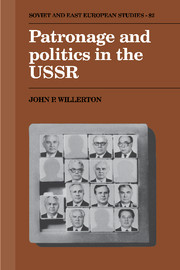Book contents
- Frontmatter
- Contents
- List of tables
- Preface
- Introduction
- 1 The elite, patronage, and Soviet politics
- 2 Networks and coalition building in the Brezhnev period
- 3 Patronage and the Brezhnev policy program
- 4 Patronage, Gorbachev, and the period of reform
- 5 Patronage and regime formation in Lithuania
- 6 Azerbaidzhan and the Aliev network
- 7 The logic of patronage in changing societies
- Appendix
- Notes
- Select bibliography
- Index
- Titles in the series
6 - Azerbaidzhan and the Aliev network
Published online by Cambridge University Press: 30 September 2009
- Frontmatter
- Contents
- List of tables
- Preface
- Introduction
- 1 The elite, patronage, and Soviet politics
- 2 Networks and coalition building in the Brezhnev period
- 3 Patronage and the Brezhnev policy program
- 4 Patronage, Gorbachev, and the period of reform
- 5 Patronage and regime formation in Lithuania
- 6 Azerbaidzhan and the Aliev network
- 7 The logic of patronage in changing societies
- Appendix
- Notes
- Select bibliography
- Index
- Titles in the series
Summary
Both the national and Lithuanian studies revealed how the structural conditions of the traditional Soviet system encouraged patronage networks to flourish. We have also seen, however, how changes in those underlying conditions have altered the norms by which officials are recruited and regimes are formed. Looking beyond the Slavic and Baltic settings, cultural and institutional structures have given patronage networks a special buoyancy in the Transcaucasian and Central Asian republics. Azerbaidzhan has had an especially strong reputation for pervasive mafia-type networks. Azerbaidzhani patron–client relationships have been rooted in geographical and clan ties that transcended the political rivalries of the Soviet period. Local mafias flourished in Azerbaidzhan, seemingly removed from the direct influences of outside actors even though events in Baku were closely monitored by Moscow. Azerbaidzhan is an especially appropriate setting to consider the conduct and consequences of patronage politics. We can put our earlier findings in perspective by identifying elite recruitment and regime formation norms in Azerbaidzhan and by examining the complex evolution of Soviet center–periphery relations in another regional setting. We can also consider the constraints on national regimes that attempt to root out subnational patronage networks.
The structure of the Azerbaidzhani policy process and the manner of power distribution within the republic are similar to those of Lithuania, but the dilemmas of Azerbaidzhani elite politics must be considered against a background of general domestic stability. Azerbaidzhan and its party organization were traditionally among the most stable and politically reliable of the non-Russian and Muslim republics.
- Type
- Chapter
- Information
- Patronage and Politics in the USSR , pp. 191 - 222Publisher: Cambridge University PressPrint publication year: 1991



